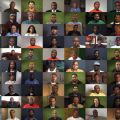
Question Bridge: Black Males
The following description was submitted by the event organizer.
Presented in conjunction with Hank Willis Thomas: All Things Being Equal…, on view in the Main Building, Question Bridge: Black Males is a project of Cause Collective, a long-term project-based collaboration between Thomas and a team of artists, designers and ethnographers who create innovative forms of public art that spark cross-cultural conversations.
Question Bridge: Black Males is a documentary in multiple forms: a gallery installation, a website, a book and a curriculum. It presents diverse experiences of Black men through a video question-and-answer exchange, a “question bridge,” to break down stereotypes of Black male identity perpetuated by America’s white dominant culture. Thomas and collective members Chris Johnson, Bayeté Ross Smith and Kamal Sinclair traveled across the United States, recording questions from nearly 160 men, bringing the questions to others to answer and filming additional questions from those respondents that other participants, in turn, could later address. The project enables a large group of men to speak to each other across geographic, economic, political and generational divisions.
The tragic death of his cousin Songha Willis drove Thomas’s commitment to making Question Bridge: Black Males: “I [had] struggled for eight years to find creative ways to deal with my cousin’s murder and the larger genocide of African American males. For me the problem seems tied to the overall myth of Black maleness. The image of the Black male created by commercial media and historical suggestion is a fraud. My aim is to expose it.”
The single-channel projection creates the sensation of a virtual conversation, with participants speaking across time and distance and from their own lived experience. Their voices are key: being heard, not just seen, reaffirms each man’s subjectivity and counteracts dangerous generalizations about group identity. In Thomas’s human-centered art, the elementary call to hear and see one another—to recognize each other as unique yet interdependent human beings—is undeniably necessary to overcome racism.
Curated by Sara Krajewski, The Robert and Mercedes Eichholz Curator of Modern and Contemporary Art and Julia Dolan, Ph.D., The Minor White Curator of Photography.